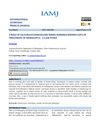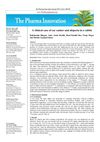 136 citations,
May 2016 in “Phytotherapy Research”
136 citations,
May 2016 in “Phytotherapy Research” Turmeric may have benefits for skin health, but more research is needed to confirm its effectiveness.

Coconut oil and turmeric were almost as good as 2% ketoconazole shampoo for treating dandruff.
 September 2018 in “Value in Health”
September 2018 in “Value in Health” Turmeric can improve knee arthritis, depression, and metabolic syndrome, but more large-scale trials are needed to confirm these benefits.
 205 citations,
September 2018 in “Nutrients”
205 citations,
September 2018 in “Nutrients” Essential oils from Curcuma species, like turmeric, have compounds that can fight inflammation, cancer, and bacteria, and can also stimulate hair regrowth in bald males.
 14 citations,
August 2018 in “Nanoscale Research Letters”
14 citations,
August 2018 in “Nanoscale Research Letters” Turmeric may improve knee osteoarthritis, depression, and metabolic syndrome, but evidence is weak.
 3 citations,
May 2016 in “International Journal of Research in Ayurveda and Pharmacy”
3 citations,
May 2016 in “International Journal of Research in Ayurveda and Pharmacy” Ayurveda, using herbs like ginger, garlic, and turmeric, can reduce chemo-radiotherapy side effects in cancer patients.
 1 citations,
July 2019 in “British Journal of Dermatology”
1 citations,
July 2019 in “British Journal of Dermatology” Minoxidil was more effective than laser therapy for hair loss, and the report also highlighted the need for more research on PRP for a different hair loss condition, the impact of social media on alopecia views, and a warning on turmeric causing nail discoloration.
 June 2021 in “International Ayurvedic Medical Journal”
June 2021 in “International Ayurvedic Medical Journal” Ayurvedic treatments like leech therapy and turmeric-neem paste can effectively treat alopecia areata without harmful side effects.
May 2020 in “Business Innovation & Entrepreneurship Journal” PASIKULA, a turmeric-based hair removal product, successfully sold well and boosted turmeric's economic value.
 January 2020 in “Nasza Dermatologia Online”
January 2020 in “Nasza Dermatologia Online” A mixture of Dijon mustard, turmeric powder, and linseed oil can effectively treat alopecia barbae.
 25 citations,
March 2018 in “Clinics in Dermatology”
25 citations,
March 2018 in “Clinics in Dermatology” Indigenous herbal medicines in the Indian subcontinent have potential for drug development but need more research and standardization.
 10 citations,
May 2018 in “Nutrition and Cancer”
10 citations,
May 2018 in “Nutrition and Cancer” Certain spices may help prevent and treat skin cancer, but more human trials are needed.
 January 2024 in “Elsevier eBooks”
January 2024 in “Elsevier eBooks” Plant biomass materials are effective and eco-friendly for skin and hair care in cosmetics.

Coconut and castor oils may naturally boost hair growth by increasing keratin.
 January 2023 in “Our Dermatology Online”
January 2023 in “Our Dermatology Online” An old recipe called "Champigny Saumure" might help treat a rare scalp condition.
 November 2021 in “Journal of pharmaceutical research international”
November 2021 in “Journal of pharmaceutical research international” Herbal depilatories are safer and cause fewer side effects than chemical ones for hair removal.
 March 2021 in “International journal for research in applied science and engineering technology”
March 2021 in “International journal for research in applied science and engineering technology” Herbal hair dyes from tannin-rich plants are effective and safer than synthetic dyes.
January 2019 in “Frontiers in neurology” A nutrition program significantly improved a woman's lupus symptoms.
January 2019 in “Frontiers in neurology” A nutrition program improved a young woman's concussion symptoms.
 November 2017 in “Deleted Journal”
November 2017 in “Deleted Journal” The rabbit's ear canker and hair loss improved significantly with treatment.
 April 2024 in “MGM Journal of Medical Sciences”
April 2024 in “MGM Journal of Medical Sciences” Traditional Indian home remedies are effective and culturally important.
 April 2020 in “Food Research”
April 2020 in “Food Research” The document discusses various topics including the use of plant derivatives for hair loss, potential food additives, antioxidant properties of different extracts, and the study of bacteria on stainless steel surfaces.
January 2016 in “Frontiers in Neurology” A clinical nutrition program improved sensory and motor function in a 60-year-old with anti-MAG neuropathy.
 170 citations,
September 2019 in “Evidence-based Complementary and Alternative Medicine”
170 citations,
September 2019 in “Evidence-based Complementary and Alternative Medicine” Some medicinal plants can help heal wounds and may lead to new treatments.
 57 citations,
October 2021 in “Journal of ethnopharmacology”
57 citations,
October 2021 in “Journal of ethnopharmacology” Indian herbal medicine shows promise for treating skin diseases but needs more research to prove effectiveness.
48 citations,
March 2005 in “PubMed” Some plant-based compounds might help control the growth of new blood vessels if further research confirms their effectiveness.
 40 citations,
August 2018 in “Skin appendage disorders”
40 citations,
August 2018 in “Skin appendage disorders” Some alternative treatments for hair loss might work, but more research is needed.
 37 citations,
January 2019 in “Dermatologic Therapy”
37 citations,
January 2019 in “Dermatologic Therapy” A dietary supplement with Boswellia serrata, Curcuma longa, and Vitis vinifera showed potential improvement in hair health for telogen effluvium patients, but more research is needed.
 32 citations,
November 2020 in “Nanomaterials”
32 citations,
November 2020 in “Nanomaterials” Excipients greatly affect how well curcumin nanocrystals penetrate the skin and target hair follicles.
 31 citations,
February 2021 in “Nutrients”
31 citations,
February 2021 in “Nutrients” Curcumin may improve blood sugar levels and cholesterol in people with PCOS, but more research is needed.

























